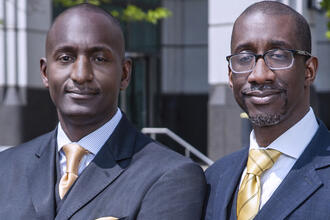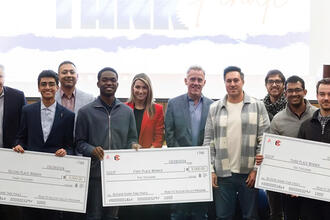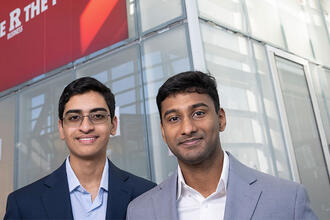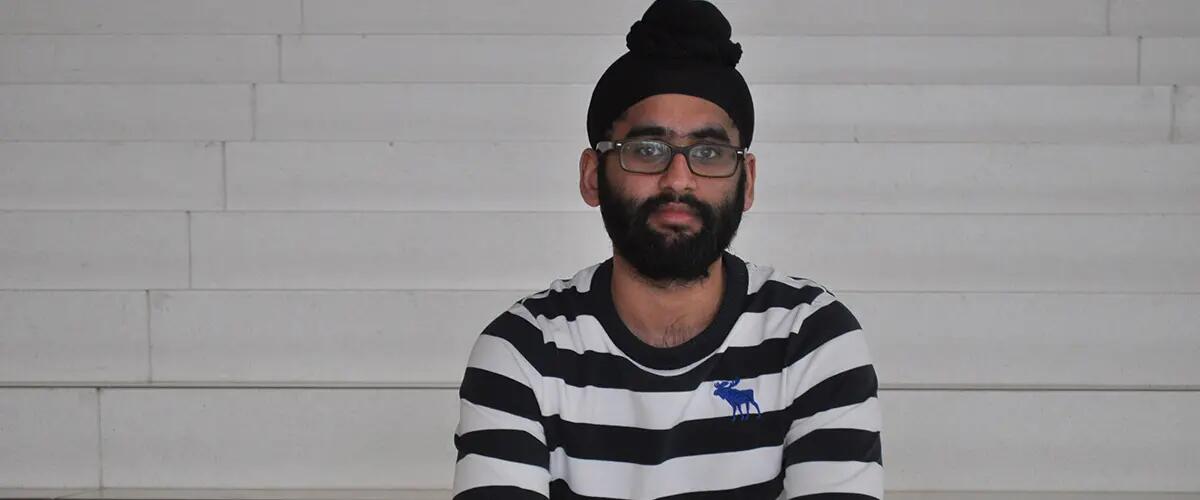
Akashdeep Randhawa
Student juggles classes and the challenges of being a startup CEO
Akashdeep Randhawa came to Rutgers to study science. Along the way, he became an entrepreneur, building a start-up company around an invention with the potential to improve results for millions of patients in physical therapy.
Randhawa started Smart MS3 (Muscle Sensing in Three Dimensions) after his grandmother suffered a stroke. He wanted to do something to keep her motivated to continue intense physical therapy to restore her ability to hold things and to walk.
The company’s disc-shaped monitor is about the size of an adult hand and powered by electrodes that can record a patient’s activity and collect data on how hard their muscles are working. The data provides patients with a better understanding of how therapy is working their muscles, which activities are helping the most, measuring progress.
“I deeply believe in the technology we’re developing,” Randhawa said. “I know it’s going to be helpful to people.”
A junior at the School of Arts and Sciences majoring in bio neuroscience, Randhawa is also minoring in entrepreneurship at Rutgers Business School. He is an example of a generation of student entrepreneurs Rutgers is producing in an ecosystem of instruction, networking, and mentorship.
As a student, he is applying his classroom lessons almost instantly. As a chief executive officer, he is leading his team through the challenging real-world experience of founding a business.
“Akash is an amazing guy,” said Rutgers Business School's Assistant Director of Undergraduate Entrepreneurship Programs Alfred Blake who invited Randhawa to join the inaugural cohort of the Entrepreneurship Living and Learning Community. “He’s extremely disciplined, poised and relentless,” Blake said. “He doesn’t waste any opportunity.”
Randhawa’s determination comes through when he describes the reiteration of refining a pitch, learning what resonates with investors or navigating through the chip shortage caused by the COVID-19 pandemic. “If you put a brick wall in front of me,” he said, “I’ll figure out a way through it.”
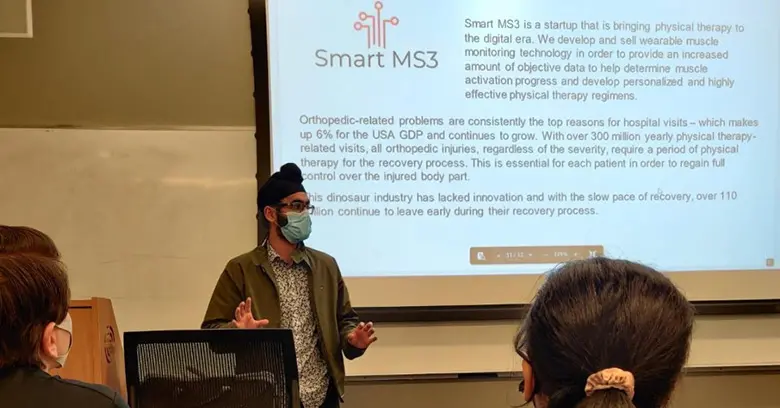
After nearly two years and 15 pitch competitions, Randhawa and his team recently won two, including first place at the regional round of the Global Student Entrepreneurship Awards. Members of the Smart MS3 team recently faced off against graduate students and alumni in Rutgers Business School’s annual business plan competition to win $10,000 in prize money.
The spring brought another exciting development when Randhawa learned that Smart MS3 was selected to be one of 12 startups selected for the TechStars NYC Accelerator Program. Randhawa's startup faced competition from more than 48 countries to win the spot in the program's spring cohort.
Randhawa started his study of entrepreneurship serendipitously. In a conversation with Blake during his first days at Rutgers, he learned about the Entrepreneurship LLC, which Blake had just started on the Livingston Campus.
The LLC brings together cohorts of freshman students from across the university who have an interest in entrepreneurship. During freshman year, they live together in dormitory, supporting and inspiring one another. For many it’s the springboard into an ecosystem that fosters inventiveness and ingenuity. After speaking with Blake, Randhawa quickly moved from his dorm on the Cook Campus to join the LLC. “The business side was not something I expected,” Randhawa said. “I was thinking I have this awesome idea. Why not join a group of like-minded people.”
Blake introduced him to entrepreneurship instructor Mukesh Patel, who brings the experience of entrepreneur, lawyer, investor, and advisor to his teaching. With that introduction Randhawa gained entry to the Honor College’s Innovation Lab where he connected with other student entrepreneurs. Three students from the Honors College are now part of his team. Patel also leads Road to Silicon V/alley, a student organization that Randhawa joined to network with other entrepreneur-minded students.
In addition to Blake and Patel, he counts RBS instructors Gary Minkoff and Kristy Fall among his mentors. One of his classes with Minkoff was a practicum that allowed him to focus on building his company and getting academic credit for it. The combination of science and business have “fed into each other,” Randhawa said.
“I go to neuroscience class, and it teaches me more about the brain interfacing with the body and that gets directly applied to what I’m working on,” he said. “On the business side, I go into entrepreneurship classes, and they tell me how to present, how to prepare a pitch deck, how to incorporate a company.
“I have such a short feedback loop of learning and implementation that the second I learn, a couple of days later, I’m already implementing the ideas,” he said.
When Randhawa’s team won the pitch competition in January, the accomplishment was a testament to practice and determination, but what mattered even more than the prizes was getting the company on the radar of New Jersey’s angel investment community.
“This win got us on the radar,” he said. “It takes away the image of us being a group of college students to us being a team of founders working on something to change the world.”
His team consists of Randhawa’s high school friend Varun Kota, a biology student at Nova Southeastern; Fahad Karim, a 2019 graduate from the University of Michigan, Rutgers alumnus Hammad Farooqui (SOE, ’19) and Rutgers student Manu Sankaran (SAS, ’23). The newest additions to the team are Rutgers Honors College students, Anna Zhang, (SAS ‘22), Iris Zhorov (SAS ’24) and Rehan Yadav (RBS ’24).
Even before the pitch win, Smart MS3’s device was gaining validation in pilots run by a network of physical therapy clinics. The pilots are also helping to attract investors, venture capitalists and angels, including former Mr. Olympian bodybuilder Shenru Aangrish. To date, the team has raised $250,000 in financing. Within months, they expect to finish a second round that is expected to generate another $250,000.
Randhawa’s grandmother, who inspired Smart MS3, has gone from bedridden to walking with assistance and a cane. Her progress has helped to sustain Randhawa through the rollercoaster of being a student CEO. “For anyone trying to build something like this, for every step forward you take, you have 30 rejections before you take another step forward,” he said. “It’s hard, but at the end of the day, I remember what I’m working for and that’s the compass that’s guiding me.”
Read about the success of other student entrepreneurs at Rutgers:
Rutgers award-winning invention aims to reinvent drug delivery
Rutgers IDEA helps student entrepreneurs to empower pregnant women
- Susan Todd
Press: For all media inquiries see our Media Kit
